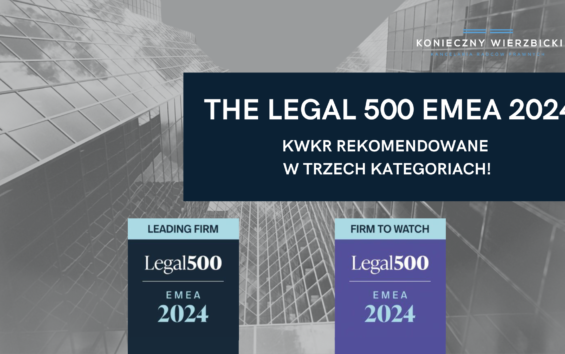
On May 15 this year, some of the provisions of the Act were updated on March 30, 2021. The matter concerns, among others, anti-money laundering and counter-terrorist financing. In connection with the new regulations, we would like to remind you of the obligations that must be fulfilled by an entrepreneur covered by the scope of the Act.
What is the AML Act?
On March 1, 2018, the Anti-Money Laundering and Financing of Terrorism Act was implemented. Thus, a catalog of entities burdened with specific obligations was established. Their purpose is to minimize the risk of these entities being used in money laundering or terrorist financing.
Which companies are entities under the AML Act?
In the AML Act, the so-called obligated institutions are, among others: banks, insurance companies, investment funds and entities managing investment funds, alternative investment companies and companies managing them, entrepreneurs conducting cantor activities, entrepreneurs conducting casinos, entities trading virtual currencies.
Obligated institutions are also entities that provide services of establishing companies and other legal persons for their clients, managing these companies, or providing such legal persons with their seats (so-called virtual office). All of the above entities, according to the AML Act, should apply precautionary measures that will reduce the risk of money laundering or terrorist financing.
Changes concerning obliged institutions
As of July 31, 2021, the catalog of obligated institutions will be expanded. Until now, they were entities providing bookkeeping services, but the law was silent on entrepreneurs providing other bookkeeping-related services. As of July 31, 2021, this will change. According to the new assumptions, entrepreneurs whose primary business activity is not directly related to finance are also obliged institutions. They may, for example: provide services involving the preparation of declarations, keep tax books, provide advice, opinions, or explanations on the provisions of tax or customs law.
A new category of the obliged institution is also entities participating in trade in works of art. Including when such trading takes place in auction houses or art galleries.
Personal customer data: regulations AML
Identification of the customer comes down to obtaining information from the customer regarding his/her name, surname, PESEL or date of birth, country of birth, nationality, identity card number and series, as well as residential address.
In the case of self-employed persons, it is also necessary to determine the company name, business address, and Tax Identification Number.
If the customer is a legal entity, the identification will involve establishing the name, legal form, address of the registered office or place of business, and Tax Identification Number. In addition, the required information includes the first name, last name, and PESEL (or date of birth) of the persons representing the entity.
Absolute application of security measures
Inability to apply economic measures should be a reason for refusal to establish business relations, refusal to carry out an occasional transaction, or termination of already established business relations.
Financial Security Measures for Obligated Institutions
Lower and Higher Risk of Terrorist Financing
An obligated institution should assess the risks associated with business relationships or occasional transactions on an ongoing basis. A lower level of risk is evidenced by, among other things, the customer’s affiliation with a public finance entity, a company owned by the State Treasury or a local government unit, and being a resident of an EU or EFTA country.
Circumstances that may indicate a higher risk of money laundering or terrorist financing are:
- carrying out transactions without the simultaneous presence of the parties;
- the transaction related to a country considered by the European Commission as a high-risk third country;
- an unusual, excessive ownership structure of the customer.
From October 31, 2021, obliged institutions will have to take several issues into account when assessing the higher risk of a transaction. They will have to check whether the transaction is related to petroleum, weapons, precious metals, tobacco products, cultural artifacts, ivory, protected species, or other objects of archaeological, historical, cultural, and religious significance or special scientific value. In addition, it will be necessary to check whether the transaction involves the transfer of property values by the foreigner to the EU state as a “payment” for obtaining citizenship.
It is worth paying attention to transactions with a value exceeding EUR 15,000 or those where there is a suspicion of connection with money laundering or financing of terrorism. The institution is required to immediately report such transactions to the General Inspector of Financial Information.
Politically exposed person
When establishing a relationship with a new client, it is necessary to verify whether the client has any connection with a politically exposed position. He may hold such a title himself, it may be his family member or a close associate.
The AML Act adopts a very broad definition of a politically exposed person. The list of politically exposed positions includes heads of government, heads of state, ministers, and parliamentarians. It also includes members of the board of directors of political parties, directors general of provincial offices, and judges of high courts, whose decisions are not subject to appeal. Establishing a business relationship with a politically exposed person requires the approval of a member of the senior management of the obligated institution. Appropriate measures must also be taken to verify the origin of the assets used in the transaction.
Internal procedures are the best safeguard
The AML Act uses concepts with a high level of generality. Therefore, the obliged institution itself should detail the scope of duties carried out in the framework of AML and terrorist financing prevention. To this end, it is recommended to create an appropriate procedure in this regard. The procedure should determine, among others, the principles for the application of security measures, how to document the actions are taken, the principles for reporting suspicious transactions to the General Inspectorate of Financial Information (GIFI).
The entrepreneur is obliged to provide its employees and co-workers with up-to-date knowledge within the scope of their duties resulting from the AML Act. Moreover, he should inform about the procedures in force in a given institution.
The secure flow of information
The Act also requires entrepreneurs to provide secure and anonymous channels for the flow of information. Then, employees and associates of the obliged institution would be able to report violations of the AML Act securely and anonymously.
In addition, the entrepreneur should develop a procedure of conduct. It will specify the way of transmitting and receiving notifications and the way of analyzing the notifications. Additionally, based on the information provided in the report, it is possible to determine the manner of taking remedial measures and protecting the person who reported the violation against repressive actions (e.g. deterioration of employment conditions, discrimination, threats).
Responsibility
To ensure that the responsibilities identified above are carried out, the obligated institution should designate a member of senior management. He or she would be responsible for carrying out the obligations under the AML Act (usually this will be a member of the board of directors). In addition, the institution should have a person responsible for implementing the obligations under the Act and a person to oversee the implementation and performance of those obligations. In the case of sole proprietors, all these functions may be performed by one person – the entrepreneur.
Consequences of neglecting duties
The catalog of administrative penalties is quite broad. It can include publication of information about the found violation, an order to stop violations, revocation of a license, or permit to conduct business. An administrative monetary penalty may also be imposed.
The pecuniary penalty is set as twice the benefit gained or the loss avoided as a result of the violation, up to an amount of €1,000,000. In the case of certain obligated institutions, the fine may be higher. A penalty of up to €5,000,000 may be imposed on a bank, a cantor owner, an insurance company, or an investment fund. Another penalty option is 10% of the turnover shown in the last approved or consolidated financial statements for the financial year. If the obligated institution is a natural person, a penalty of a maximum of 20,868,500 PLN may be imposed on it.
It may be suspected that a transaction is connected with money laundering and financing of terrorism. In such cases, institutions are required to report such transactions to the Chief Inspector of Financial Information. Failure to do so is a crime punishable by imprisonment from three months to five years.



